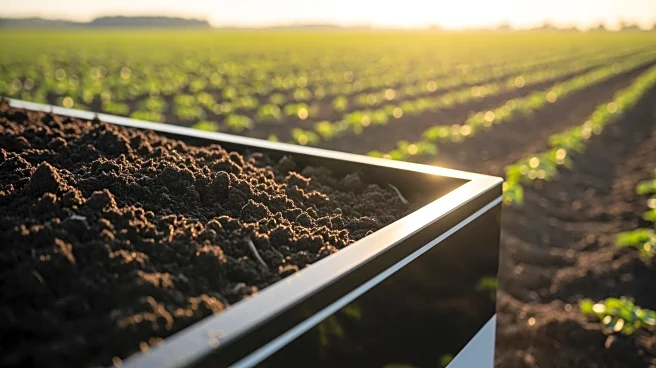What's Happening?
Pivot Bio has announced the introduction of a dry planter box formulation for its Proven G3 and Cert-N products, set to launch in 2026. This new option allows farmers to apply the technology directly in the planter box,
similar to graphite or talc, and includes a micronutrient carrier to support early root development. The dry formulation complements existing liquid in-furrow and on-seed treatment options, providing farmers with more flexibility in application methods. Additionally, Pivot Bio has reduced product pricing for the second consecutive year, making its microbe-based nitrogen solutions more affordable compared to synthetic fertilizers.
Why It's Important?
The introduction of a dry planter box option by Pivot Bio represents a significant advancement in agricultural technology, offering farmers a more convenient and cost-effective method for applying microbe-based nitrogen solutions. This development is crucial as it addresses the need for sustainable farming practices that reduce reliance on synthetic fertilizers, which can be harmful to the environment. By providing a more accessible and affordable option, Pivot Bio is helping farmers improve crop yields and soil health while reducing input costs.
What's Next?
Pivot Bio plans to continue its focus on customizing nitrogen guidance to match individual farmers' existing nitrogen programs, ensuring optimal results. The company will also expand its offerings in cotton with Cert-N, tailored to the specific needs of cotton growers. As the new dry formulation is rolled out, Pivot Bio will work on onboarding, training, and change management to help farmers integrate the technology into their operations. The success of these initiatives could lead to broader adoption of microbe-based nitrogen solutions in the agricultural sector.
Beyond the Headlines
The shift towards microbe-based nitrogen solutions reflects a growing trend in agriculture towards more sustainable and environmentally friendly practices. This approach not only benefits farmers by reducing costs and improving yields but also contributes to broader efforts to mitigate climate change and protect natural resources. As the industry continues to innovate, the adoption of such technologies could lead to significant changes in farming practices and the agricultural landscape.










